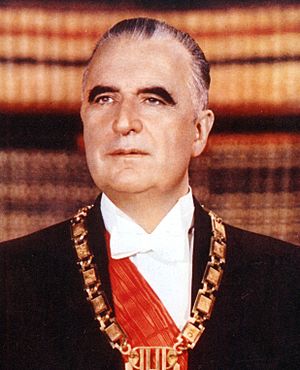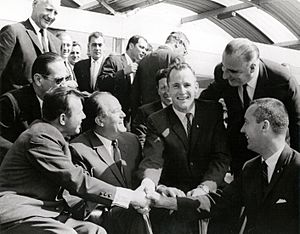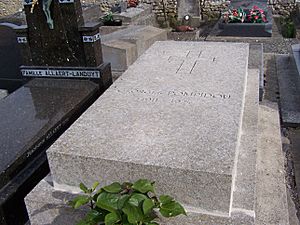Georges Pompidou facts for kids
Quick facts for kids
Georges Pompidou
|
|
|---|---|

Official portrait, 1969
|
|
| President of France | |
| In office 20 June 1969 – 2 April 1974 |
|
| Prime Minister | Jacques Chaban-Delmas Pierre Messmer |
| Preceded by | Charles de Gaulle |
| Succeeded by | Valéry Giscard d'Estaing |
| Prime Minister of France | |
| In office 14 April 1962 – 10 July 1968 |
|
| President | Charles de Gaulle |
| Preceded by | Michel Debré |
| Succeeded by | Maurice Couve de Murville |
| Member of the Constitutional Council | |
| In office 5 March 1959 – 14 April 1962 |
|
| Appointed by | Charles de Gaulle |
| Preceded by | Position established |
| Succeeded by | Bernard Chenot |
| Additional positions | |
| Personal details | |
| Born |
Georges Jean Raymond Pompidou
5 July 1911 Montboudif, France |
| Died | 2 April 1974 (aged 62) Paris, France |
| Resting place | Orvilliers Cimetiere Orvilliers, France |
| Political party | Union of Democrats for the Republic (1968–1974) |
| Other political affiliations |
Union for the New Republic (Before 1968) |
| Spouse | |
| Children | Alain |
| Alma mater | École Normale Supérieure Sciences Po |
| Signature | |
| Military service | |
| Allegiance | France |
| Branch/service | French Army |
| Years of service | 1940 |
| Rank | Lieutenant |
| Unit | 141st Alpine Infantry Regiment |
| Battles/wars | Second World War |
| Awards | Croix de Guerre |
Georges Jean Raymond Pompidou (born 5 July 1911 – died 2 April 1974) was a French politician. He served as the President of France from 1969 until his death in 1974. Before becoming president, he was the Prime Minister of France under President Charles de Gaulle. He held this role from 1962 to 1968, which is the longest time anyone has served as prime minister in France.
During his time as president, France experienced strong economic growth. Pompidou continued to modernize the country, a policy started by de Gaulle. He supported big projects like the Concorde airplane and the TGV high-speed train. The government invested a lot in industries like cars, food, steel, and nuclear power. He also created the minimum wage (SMIC) and the Ministry of the Environment.
In foreign policy, Pompidou wanted France to be independent, like de Gaulle. He improved relations with the United States under President Richard Nixon. He also had close ties with the USSR and helped the United Kingdom join the European Economic Community (EEC). This was different from de Gaulle, who had been against the UK joining.
Pompidou died in office in 1974 from a rare type of blood cancer. Many French political experts think highly of his time as president. He was also a talented writer. His book, "Anthology of French Poetry," is still used in schools today. He loved modern art, and the famous Centre Pompidou in Paris is named after him. This art center opened in 1977 and now has branches in other cities around the world.
Contents
Early Life and Education
Georges Pompidou came from a humble background. His grandparents were farmers in Cantal, France. His parents were teachers. His story is often used as an example of how public schooling in France helped people improve their lives.
Georges Jean Raymond Pompidou was born on 5 July 1911 in Montboudif, France. He studied at famous schools like Lycée Pierre-de-Fermat and Lycée Louis-le-Grand. He became friends with Léopold Sédar Senghor, who later became a poet and statesman in Senegal. Pompidou then went to the École Normale Supérieure and earned a degree in literature.
He first taught literature at a high school in Paris. In 1953, he started working for the Rothschild bank. By 1956, he became the bank's general manager, a job he held until 1962. Later, Charles de Gaulle hired him to help manage a foundation for children with Down syndrome.
Serving as Prime Minister

Georges Pompidou became the Prime Minister of France on 14 April 1962, after Michel Debré resigned. He served until 10 July 1968. This makes him the longest-serving prime minister under France's Fifth Republic. His appointment was unusual because he was not a member of the National Assembly.
In October 1962, he faced a vote of no-confidence, but de Gaulle dissolved the National Assembly. Pompidou's party won the next election, and he was reappointed prime minister. In 1964, he dealt with a miners' strike. He also led his party to a small victory in the 1967 election.
Pompidou played a key role in peacefully ending the student protests of May 1968. He worked to resolve the situation by talking with trade unions and employers. However, during these events, some disagreements arose between Pompidou and de Gaulle. Their relationship became strained. After his party won a huge victory in the 1968 election, Pompidou resigned. Many saw him as the natural person to take over from de Gaulle. He announced his plan to run for president in January 1969.
As prime minister, Pompidou also helped create the National Employment Fund in 1963. This fund aimed to help people find jobs during changes in industries.
Presidency
After Charles de Gaulle resigned in 1969, Pompidou was elected President of France. In the election on 15 June 1969, he won against Alain Poher with 58% of the votes. Pompidou was a supporter of de Gaulle's ideas but was more practical. He helped the United Kingdom join the European Community on 1 January 1973.
He started a plan to industrialize France. He also launched the Arianespace project and the TGV high-speed train project. He continued to develop France's civilian nuclear program. He was cautious about some of his prime minister's new ideas. In 1972, he replaced his prime minister with a more traditional politician. Pompidou also worked to strengthen his political party by paying attention to local needs.
Foreign Relations
The United States wanted to improve relations with France after de Gaulle left office. U.S. President Richard Nixon and his advisor Henry Kissinger respected Pompidou. They agreed on most important policy matters. The United States even offered to help France with its nuclear program. However, economic problems arose later, especially concerning the American dollar.
Pompidou also wanted to keep good relations with former French colonies in Africa. In 1971, he visited several African countries. He offered cooperation and financial help without being bossy. He also tried to build stronger ties with countries in North Africa and the Middle East.
Modernizing Paris
During his presidency, Pompidou worked hard to modernize Paris, the capital city of France. He started the construction of a modern art museum, which is now called the Centre Pompidou. This museum is located near the Marais area of Paris. Other modernization projects included replacing the old open-air markets at Les Halles with a shopping mall. He also oversaw the building of the Montparnasse Tower and a new expressway along the Seine River.
-
Pompidou with U.S. president Richard Nixon in Reykjavík, 31 May 1973.
-
Pompidou with West German chancellor Willy Brandt in Cologne, 3 July 1972.
Death in Office
Georges Pompidou died on 2 April 1974, while still serving as president. He passed away in his apartment from a rare form of blood cancer. His body was buried on 4 April in the churchyard of Orvilliers. This was where he had a weekend home. A large memorial service was held for him at Notre-Dame de Paris. About 3000 important people attended, including 28 heads of state. April 6 was declared a national day of mourning in France.
Many important people attended his memorial service, including:
 United Nations Secretary General Kurt Waldheim
United Nations Secretary General Kurt Waldheim UNESCO Director General René Maheu
UNESCO Director General René Maheu European Union President of the European Commission Jean Rey
European Union President of the European Commission Jean Rey NATO Secretary General Joseph Luns
NATO Secretary General Joseph Luns France (Interim) President Alain Poher
France (Interim) President Alain Poher United States President Richard Nixon
United States President Richard Nixon Canada Prime Minister Pierre Trudeau
Canada Prime Minister Pierre Trudeau United Kingdom Prime Minister Harold Wilson and predecessor Edward Heath
United Kingdom Prime Minister Harold Wilson and predecessor Edward Heath West Germany Chancellor Willy Brandt
West Germany Chancellor Willy Brandt East Germany President Manfred Gerlach
East Germany President Manfred Gerlach Austria Chancellor Bruno Kreisky
Austria Chancellor Bruno Kreisky Switzerland President Hans-Peter Tschudi
Switzerland President Hans-Peter Tschudi Morocco King Hassan II
Morocco King Hassan II Belgium King Baudouin
Belgium King Baudouin Netherlands Queen Juliana
Netherlands Queen Juliana Ethiopia Emperor Haile Selassie
Ethiopia Emperor Haile Selassie Tunisia President Habib Bourguiba
Tunisia President Habib Bourguiba Italy President Giovanni Leone
Italy President Giovanni Leone Turkey Prime Minister Bülent Ecevit
Turkey Prime Minister Bülent Ecevit Finland President Urho Kekkonen
Finland President Urho Kekkonen Soviet Union President Nikolai Podgorny
Soviet Union President Nikolai Podgorny Yugoslavia Prime Minister Petar Stambolić
Yugoslavia Prime Minister Petar Stambolić Czechoslovakia President Gustáv Husák
Czechoslovakia President Gustáv Husák Denmark Prime Minister Poul Hartling
Denmark Prime Minister Poul Hartling Sweden Prime Minister Olof Palme
Sweden Prime Minister Olof Palme Portugal President of Portugal Américo Tomás
Portugal President of Portugal Américo Tomás Spain Crown Prince Juan Carlos I of Spain
Spain Crown Prince Juan Carlos I of Spain Monaco Prince Rainier III
Monaco Prince Rainier III Luxembourg Grand Duke Jean
Luxembourg Grand Duke Jean Japan Prime Minister Kakuei Tanaka
Japan Prime Minister Kakuei Tanaka South Korea Prime Minister Kim Jong-pil
South Korea Prime Minister Kim Jong-pil North Vietnam Foreign Minister Nguyễn Duy Trinh
North Vietnam Foreign Minister Nguyễn Duy Trinh South Vietnam President Nguyễn Văn Thiệu
South Vietnam President Nguyễn Văn Thiệu
There was some discussion about how Pompidou's illness was kept secret. After his death, politicians agreed that future presidents should share information about their health. However, later presidents, like François Mitterrand, also kept their health issues private.
Pompidou's wife, Claude Pompidou, lived for more than thirty years after him. They had an adopted son, Alain Pompidou. He later became the president of the European Patent Office.
As a sign of respect, France withdrew from the Eurovision Song Contest 1974, which happened just four days after Pompidou's death.
Published Works
- Anthologie de la Poésie Française, Livre de Poche/Hachette, 1961
- Le Nœud gordien, éd. Plon, 1974
- Entretiens et discours, deux vol., éd. Plon, 1975
- Pour rétablir une vérité, éd. Flammarion, 1982
Awards and Honors
- Legion of Honour:
- Knight (1948)
- Officer (1957)
- Grand Cross (1969, as president)
- Grand Cross of the Ordre national du Mérite (France)
- Grand Cross of Order of St. Olav (Norway) (1962)
- Grand Cordon of Order of Leopold (Belgium)
- Honorary Knight Grand Cross of the Order of the Bath (United Kingdom) (1972)
- Knight Grand Cross with Collar of Order of Merit of the Italian Republic (1973)
See also
 In Spanish: Georges Pompidou para niños
In Spanish: Georges Pompidou para niños
- Centre Georges Pompidou
- Lycée Français International Georges Pompidou - A French school in Dubai and Sharjah, United Arab Emirates
 | James B. Knighten |
 | Azellia White |
 | Willa Brown |




